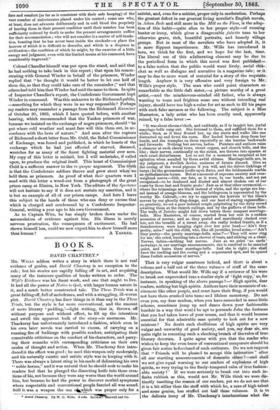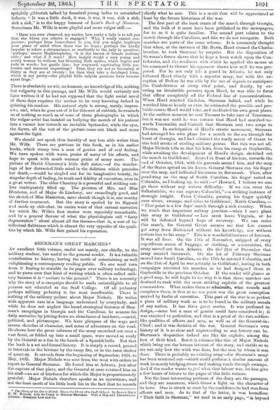BOOKS.
—0—
DAVID CHANTREY., Ma. WILLS seldom writes a story in which there is not real evidence of genius, and David Chantrey is no exception to the rule ; but his stories are rapidly falling off in art, and acquiring many of the insincere qualities of books written to order. The Wife's Evidence was his finest work, and one that ought to live. It had all the power of Notice to Quit, with larger human nature in it, and a much better constructed tale. The Three Trials was a great falling off, full of melodrama, and with a straggling, ill-woven plot. David Chantrey has finer things in it than any in the Three Trials, but the style is far more conventional, and the amount of mere literary ' padding,'—light writing, that is, thrown off without purpose and without effect, to fill up the interstices and swell the apparent bulk of the story—is enormous. Mr. Thackeray has unfortunately introduced a fashion, which even in his own later novels was carried to excess, of carrying on a running fire of badinage with possible readers, anticipating their conceivable criticisms on the condtict of his characters, and parry- ing their remarks with corresponding criticisms on their own modes of thought and action. When Mr. Thackeray first intro- duced it the effect was good ; he used this weapon only moderately, and his naturally caustic and satiric style was in keeping with it. There was always a latent sting in his mode of delineating his own " noble heroes," and it was natural that he should seek to make his readers feel that he plunged the dissecting knife into these crea- tions of his, not because they were any worse than the world around him, but because he had the power to discover morbid symptoms where respectable and conventional people fancied all was sound. Still it was a weapon the use ohotlich was proper only for a David Mammy. By W. 0. Wills. 8 vols. Lo7d01Mliaxwoll and Co. satirist, and, even for a satirist, proper only in moderation. Perhaps the greatest defect in our greatest living novelist's English novels, in Adam Bede and still more in the Mill on the Floss, is the adop- tion of this habit—quite alien to her proper style—of running banter or irony, which gives a disagreeable falsetto tone to her otherwise grave, rich, beautiful portraits, and homely village groups. But in moat of the novelists who have adopted it, it is mere flippant impertinence. Mr. - Wills has introduced it here, we think for the first, and we hope for the last, time. The liberal use of this adulterating element may be due to the periodical form in which this novel was first published— to a false notion that the public would want lively, social chit- chat as well as dialogue and narrative in a magazine tale ; or.it; may be due to mere want of material for a story of the requisite, length. Anyhow it is very offensive and very foreign to Mr.: Wills's proper style. The man who could paint characters so remarkable as the little daft sister,—a picture worthy of a great artist,--and the mischievous-minded old father, who is always wanting to teaze and frighten some one without intending real injury, should have too high a value for art as-such to fill his pages with such false sarcasm as the following. The subject is a Miss Masterton, a lady artist who has been cruelly used, apparently ruined, by a false lover :— "It was about eleven o'clock, and suddenly, as if to inspirit her, joyful marriage-bells rang out. She listened to them, and suffered them for a while ; then, as if they flouted her, up she starts and walks like one distracted up and down the room. Her loaded brushes drop from her hands, and she tramples on thorn repeatedly as she hurries backwards and forwards. Nothing but nerves, ladies. Painters and authors raise a clamour at such choral rows, street organs, and church bells, and the like ; their nerves, continually on the strain, are thrown into spasms at such cruel disturbances. Let us not for a moment be surprised at her agitation when assailed by these awful chimes. Marriage-bells are, in my judgment, a devilish device, ominous of future discord. Give us the cooing of the wood pigeons if you will, and the dulcet tinklings of harps ; let the groomsmen toed% upon flutes, and the bridesmaids warble an epithalaminm-hymn. But at &moment of supreme anxiety and over- weighted nerve—with our fate, as it were, in our hands, and not yet recognized—to be deafened and dizzied and almost shaken out of our coats by those fast and frantic peals ! Just as at that other ceremonial,— where the trimmings are black instead of white, and the sprigs are fen- nel instead of orange-blossom, and the bridegroom is represented by the worthy Mr. Caleraft,—we try to aggravate the horrors to'the felon's nerves by our ghostly ding-dongs, and our host- of staring ragamuffins ; so, precisely, we set a popr isolated couple palpitating by the dirty crowd awaiting theni at the church railings, and by the guffaws of these bells. The walla of Jericho -might fall down before these rampant marriage- bells. Miss Mastertoi3, That is very vulgar smartness indeed, and there is about a volume and a half out of the three volumes of stuff of the same description. What would Mr. Wills say if a reviewer of his were to break out unprovoked into a similar style of ' light Copy,' as, fir instance, in speaking of the above passage?—' High spirits, dear readers, nothing but high spirits. Authors have their moments of ex- citement like other people, and must have their fling, if you would not have them crushed into tame and lifeless monotony. Do not even you, my dear madam, when you have succeeded in some little scheme, sometimes jump up and dance down your fashionable boudoir in a way that wouli be apt to persuade John the footman that you had taken leave of your senses, and that it would become essential for that admirable man quietly to look out for a new mistress? No doubt such ebullitions of high spirits are very vulgar and unworthy of good society, and you, my dear sir, are quite right in resenting such a shocking broach of the rules of true literary decorum. I quite agree with you that the reader who wishes to keep the even tenor of conventional composure should be given fair notice beforehand of such outbursts. Do we not request that " Friends will be pleased to accept this intimation " of ter all our startling announcements of domestic crises ?—and shall we not give equal warning to our readers of explosions of high spirits, so very trying to the finely-tempered calm of true fashion- able society ? ' If we were seriously to break out into such in- finite rubbish as this, would not Mr. Wills think we were dis- tinctly insulting the reason of our readers, yet we do not see that it is a bit sillier than the stuff with which he, a man of high talent and some genius, has stuffed out half these volumes. It is to the delicate irony of Mr. Thackeray's interlocutions what the sprightly gibberish talked by fanatical young ladies to astonished infants, " It was a little duck, it was, it was, it was, zick a zick, zick a zick," is to the happy humour of Lear's Book of Nonsense. Sometimes Mr. Wills is more playful and more vulgar still :— " Have you ever observed, my reader, how ready a lady is to toll you that she whom you admire is engaged? Why, I really cannot con- jecture ; perhaps from benevolence to you, lest you might implicate your peace of mind when there was no hope; perhaps the kindly impulse to relate a circumstance so creditable to the lady in question ; `perhaps,' sneers Mephistopheles, 'it is the leaven of female jealousy astir;' and what if it were? How insipid would a very young and pretty woman be without her diverting little malice, which begins and ends in words ; her gentle bias; her wayward, captivating little jea- lousies and innocent coquettings! True, they are not so becoming at thirty as they are at twenty ; for then they take a developed form, which is not pretty—the playful little tadpole passions have become squat frogs." There is absolutely no wit, no humour, no knowledge of life, nothing but vulgarity in this passage, and Mr. Wills would certainly not have written it if he had not supposed that the light social novel of these days requires the author to be very knowing indeed in quizzing his readers. His natural style is strong, manly, impres- s:va, and, when he goes out of it for this sort of rubbish, he reminds us of nothing so much as of some of those photographs in which the vulgar artist has insisted on bullying the mouth of his patient into a vacant lear towards an invisible bystander, while the eyes, the figure, all the rest of the picture come out black and stern against the light. We should not speak thus harshly of any less able writer than Mr. Wills. There are portions in this book, as in his earlier books, which stamp him a man of genius and of real feeling. We have spoken with warm praise of many of his efforts, and hope to speak with much warmer praise of many more. The picture of David Chantrey's little daft sister,—of the wander- ings of her distracted little mind in the delirium which precedes her death,—would be singled out for its imaginative beauty, its singular depth of feeling, its truth and fidelity of execution, even in a great writer. The elder Chantrey is a powerful and striking out- line inadequately filled up. The pictures of Mrs. and Miss Blenheim, and of Major de Lindesey, are exceedingly good, and the sketch of Miss Masterton, mere sketch though it is, one worthy of further treatment. But the story is spoiled by its flippant aad made up chit-chat. its entire want of that earnest narrative for which Mr. Wills's first stories were especially remarkable, and by a general flavour of what the physiologists call " fatty degeneration'.' about almost all the tissues—that is, a sort of in- tellectual flabbiness which is almost the very opposite of the quali- ties by which Mr. Wills first gained his reputation.































 Previous page
Previous page